Stress has become an unwelcome companion for many of us in our fast-paced world. While lifestyle changes and self-care practices are crucial for managing stress, sometimes we need a little extra help.
That’s where calming supplements come in. I’ve researched and tested many options to bring you this comprehensive guide to the top 5 calming supplements for stress relief.
1. Ashwagandha: An Ancient Herb for Modern Stress
Ashwagandha, a herb used in Ayurvedic medicine for centuries, has gained significant attention in recent years for its stress-reducing properties. As an adaptogen, it helps your body adapt to stress and promotes overall balance.
Key benefits of Ashwagandha:
Ashwagandha works by reducing cortisol levels in the body. Cortisol, often called the “stress hormone,” can wreak havoc on our systems when chronically elevated. By lowering cortisol, Ashwagandha helps reduce feelings of anxiety and tension.
This powerful herb also improves sleep quality. Many people who take Ashwagandha report falling asleep faster and experiencing deeper, more restful sleep.
This is crucial for stress management, as poor sleep can exacerbate stress and anxiety.
Additionally, Ashwagandha enhances mental clarity and focus. When we’re stressed, our cognitive function often suffers.
Ashwagandha helps clear the mental fog, allowing for better concentration and decision-making.
Choosing and Using Ashwagandha:
When selecting an Ashwagandha supplement, look for KSM-66 or Sensoril extracts. These are standardized for potency, ensuring you get a consistent dose of the active compounds.
Start with a lower dose, typically around 300mg per day, and gradually increase as needed. Some people may experience mild side effects like stomach upset, so it’s best to take it with food.
For enhanced stress relief, try combining Ashwagandha with a mindfulness practice like meditation. The synergistic effect can be powerful in managing stress and promoting overall well-being.
Recommended Product: TRIBE ORGANICS Ashwagandha
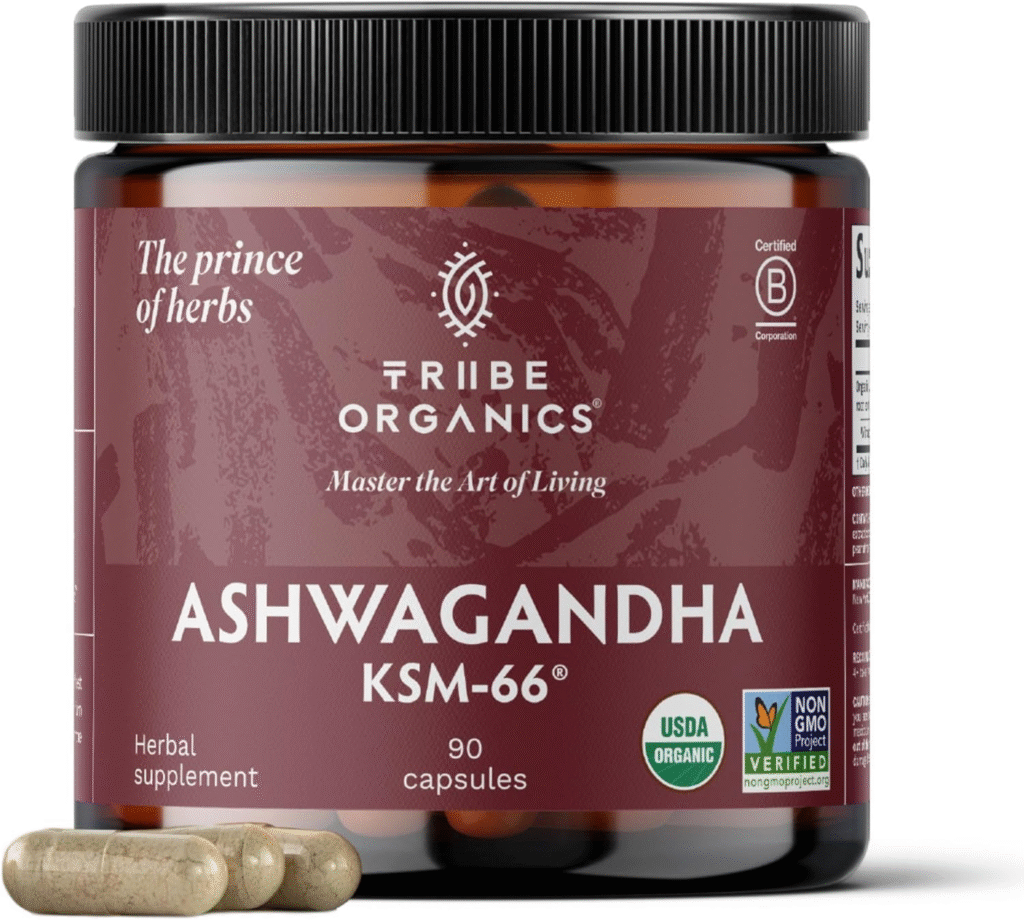
2. L-Theanine: Calm Focus in a Capsule
L-Theanine is an amino acid naturally found in green tea. It’s renowned for promoting a state of calm alertness, making it ideal for those who need to stay focused while managing stress.
How L-Theanine Works:
L-Theanine increases alpha brain waves, which are associated with relaxation and creativity. This unique property allows you to feel calm without feeling drowsy or losing mental acuity.
This amino acid also balances neurotransmitters like GABA and dopamine. GABA is a calming neurotransmitter, while dopamine is involved in motivation and focus.
By modulating these brain chemicals, L-Theanine helps create a balanced, relaxed state of mind.
L-Theanine reduces physical symptoms of stress as well. Many users report decreased heart rate and lower blood pressure when supplementing with L-Theanine, especially in stressful situations.
Using L-Theanine Effectively:
L-Theanine is generally well-tolerated and can be taken throughout the day. A typical dose ranges from 100-200mg, taken once or twice daily.
Interestingly, L-Theanine pairs well with caffeine. It offsets the jittery effects of caffeine while enhancing focus and alertness.
This combination is particularly useful for those who find coffee makes them anxious but still need a productivity boost.
For best results, look for supplements containing Suntheanine, a patented form of L-Theanine known for its purity and effectiveness.
L-Theanine can be particularly helpful for those who experience stress-related cognitive decline or “brain fog.” By promoting calm focus, it allows you to tackle tasks more efficiently, even when under pressure.
Recommended Product: NOW Foods Supplements, L-Theanine
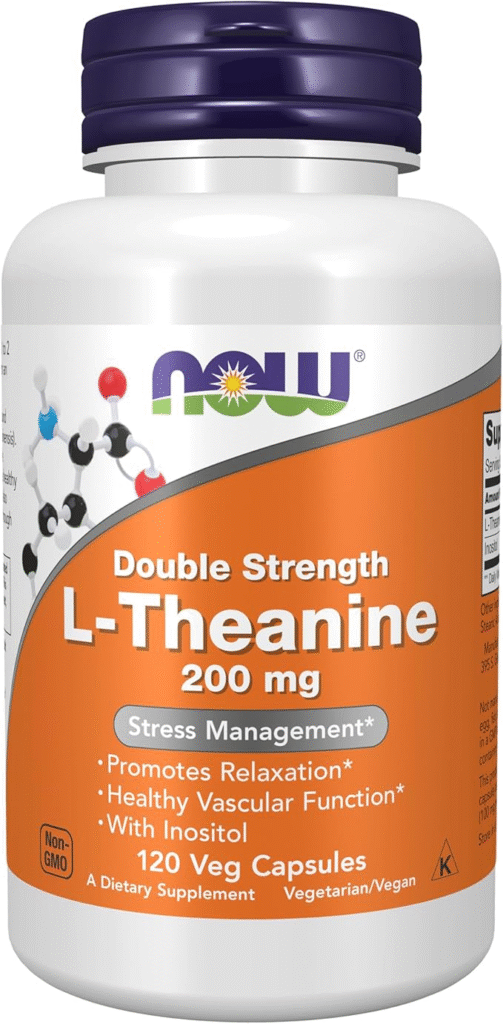
3. Magnesium Glycinate: The Relaxation Mineral
Magnesium plays a crucial role in regulating the nervous system, earning it the nickname “the relaxation mineral.” Magnesium glycinate is a highly bioavailable form that’s less likely to cause digestive issues compared to other forms of magnesium.
Benefits of Magnesium Glycinate:
Magnesium glycinate promotes muscle relaxation. When we’re stressed, our muscles often tense up, leading to discomfort and even pain. Magnesium helps relax these tense muscles, providing physical relief from stress.
This form of magnesium supports healthy sleep patterns. It helps regulate melatonin, the hormone responsible for our sleep-wake cycle.
Many people find that taking magnesium glycinate before bed improves their sleep quality and duration.
Magnesium also helps regulate stress hormones. It modulates the hypothalamic-pituitary-adrenal (HPA) axis, which is responsible for our stress response.
By keeping this system in balance, magnesium can help prevent the overproduction of stress hormones.
Optimal Use of Magnesium Glycinate:
When supplementing with magnesium, timing is important. Taking it in the evening can support better sleep quality.
However, some people find it helpful to split their dose, taking some in the morning and some at night.
Start with a lower dose, around 200mg, and increase gradually to avoid potential laxative effects. The recommended daily allowance for magnesium is 310-420mg for adults, depending on age and gender.
For a double dose of relaxation, try combining magnesium supplementation with Epsom salt baths. Epsom salt is magnesium sulfate, which can be absorbed through the skin, providing both physical and mental relaxation.
Product Recommendation: VitaUp Magnesium Glycinate
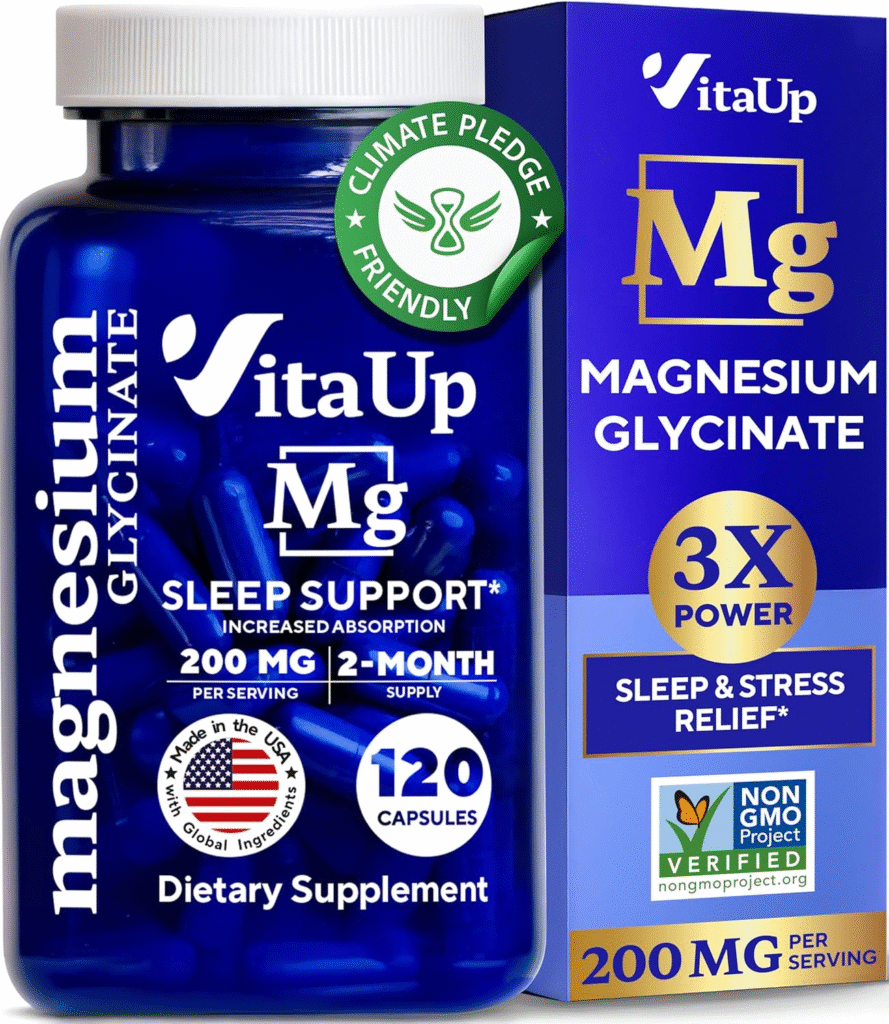
4. Rhodiola Rosea: The Fatigue-Fighting Adaptogen
Rhodiola Rosea is another powerful adaptogen that’s particularly effective for combating stress-induced fatigue. It’s been used for centuries in traditional medicine practices across Europe and Asia.
How Rhodiola Rosea Helps with Stress:
Rhodiola enhances stress resilience by modulating the body’s stress response system. It helps prevent the overproduction of cortisol and other stress hormones, allowing you to maintain calm even in challenging situations.
This adaptogen improves mental and physical performance under stress. Many users report increased energy, better focus, and improved mood when taking Rhodiola, especially during periods of high stress or intense work.
Rhodiola supports a balanced mood by influencing neurotransmitters like serotonin and dopamine. This can help reduce symptoms of stress-induced depression and anxiety.
Choosing and Using Rhodiola:
When selecting a Rhodiola supplement, look for products standardized to contain 3 percent rosavins and 1 percent salidroside. These are the active compounds responsible for Rhodiola’s stress-fighting effects.
Rhodiola is best taken in the morning or early afternoon, as it can be energizing for some people. A typical dose ranges from 200-600mg per day, but start at the lower end and increase gradually as needed.
Rhodiola may be especially useful for those dealing with burnout or chronic stress. Its ability to combat fatigue while supporting mood and cognitive function makes it a valuable tool for long-term stress management.
Recommended Product: Vitanica Rhodiola Rosea
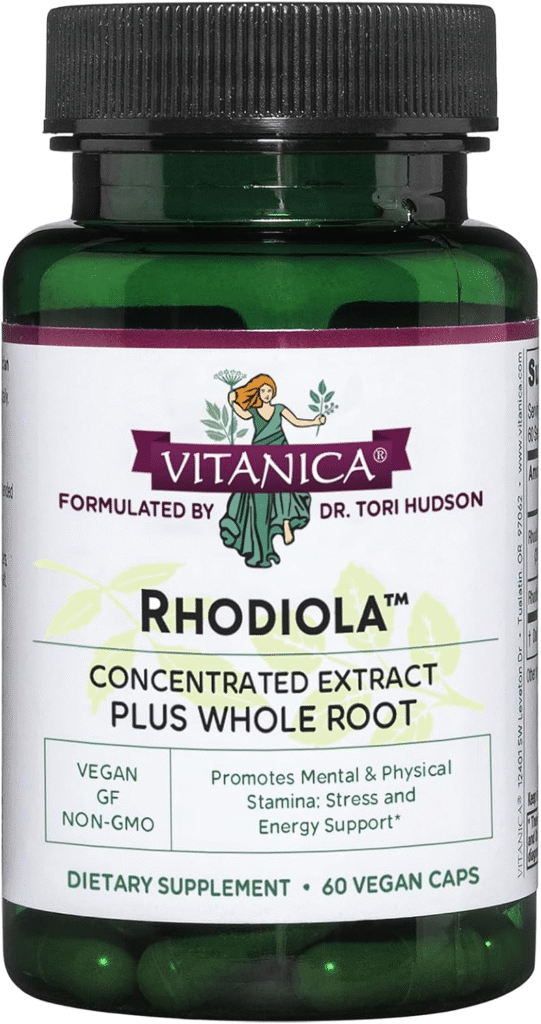
5. CBD Oil: The Calming Cannabinoid
CBD, or cannabidiol, has taken the wellness world by storm in recent years. Derived from hemp plants, CBD interacts with the body’s endocannabinoid system to promote balance and calm.
CBD’s Stress-Relieving Properties:
CBD reduces anxiety and promotes relaxation by interacting with serotonin receptors in the brain. Many users report feeling calmer and more centered after taking CBD, without the “high” associated with THC.
This cannabinoid supports healthy sleep cycles. While it doesn’t make you drowsy like some sleep aids, it can help improve sleep quality by reducing anxiety and promoting relaxation.
CBD may also help manage stress-related pain. It has anti-inflammatory properties and can modulate pain perception, which can be useful for those experiencing physical symptoms of stress.
Choosing and Using CBD Oil:
When selecting a CBD oil, opt for full-spectrum products from reputable brands that provide third-party lab testing results. Full-spectrum CBD contains a range of useful cannabinoids and terpenes that work together for enhanced effects.
Start with a low dose, around 10-20mg per day, and increase gradually until you find your sweet spot. Everyone’s optimal dose is different, so patience and experimentation are key.
For enhanced relaxation, try combining CBD oil with deep breathing exercises. The combination of CBD’s calming effects and the physiological benefits of deep breathing can be particularly effective for stress relief.
Recommended Product: Willian J Stark CBD Oil
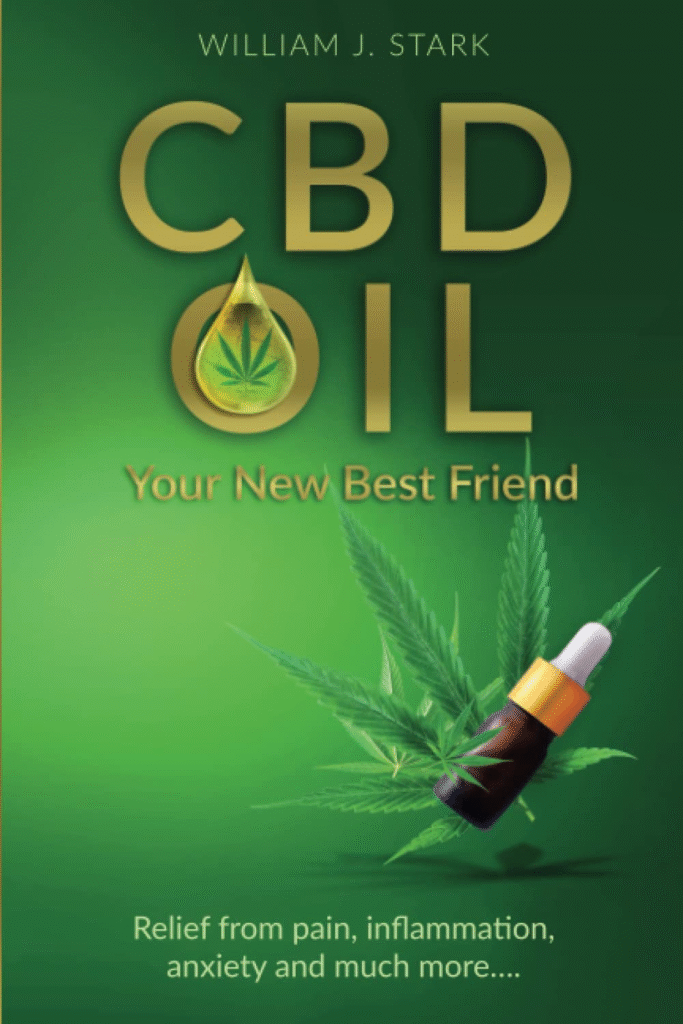
Holistic Approach to Stress Management
While these calming supplements can provide significant relief, it’s important to remember that they’re just one piece of the puzzle. A holistic approach to stress management includes several key components:
Regular Exercise:
Physical activity is a powerful stress-buster. It releases endorphins, improves mood, and helps regulate stress hormones.
Aim for at least 30 minutes of moderate exercise most days of the week.
This could be anything from brisk walking to yoga to strength training.
Balanced Diet:
What you eat can significantly impact your stress levels. A diet rich in whole foods, particularly fruits, vegetables, and omega-3 fatty acids, can help support your body’s stress response.
Avoid excessive caffeine and sugar, which can exacerbate stress symptoms.
Adequate Sleep:
Quality sleep is crucial for stress management. Aim for 7-9 hours of sleep per night.
Establish a consistent sleep schedule and create a relaxing bedtime routine to improve your sleep quality.
Stress-Reduction Techniques:
Practices like meditation, deep breathing, and progressive muscle relaxation can help calm your mind and body. Even just a few minutes of these practices each day can make a significant difference in your stress levels.
Social Connection:
Strong social connections can provide emotional support and help buffer against stress. Make time to connect with friends and loved ones regularly, even if it’s just a quick phone call or video chat.
Time Management:
Poor time management can be a significant source of stress. Use tools like calendars and to-do lists to stay organized. Learn to prioritize tasks and say no to commitments that aren’t essential.
Mindfulness:
Practicing mindfulness helps you stay present and avoid getting caught up in stressful thoughts about the past or future. Try incorporating mindfulness into your daily activities, like eating or walking.
Limit Technology Use:
Constant connectivity can contribute to stress. Set boundaries around your technology use, especially before bedtime.
Consider a “digital detox” for a few hours each day or on weekends.
Pursue Hobbies:
Engaging in activities you enjoy can be a great way to relieve stress. Whether it’s reading, gardening, painting, or playing music, make time for hobbies that bring you joy.
Professional Help:
If stress becomes overwhelming, don’t hesitate to seek help from a mental health professional. They can provide extra strategies and support tailored to your specific needs.
Incorporating Supplements into Your Stress Management Routine
When adding calming supplements to your stress management routine, it’s important to approach it thoughtfully:
- Start with one supplement at a time.
This allows you to assess how each supplement affects you individually.
- Begin with the lowest recommended dose and increase gradually if needed.
- Be consistent.
Most supplements need regular use over time to see full benefits.
- Keep a journal to track your stress levels, sleep quality, and any changes you notice.
- Be patient.
It can take several weeks to feel the full effects of some supplements.
- Remember that supplements are not a substitute for a healthy lifestyle.
They work best when combined with good diet, exercise, and stress management practices.
- Always talk to a healthcare professional before starting any new supplement regimen, especially if you have existing health conditions or are taking medications.
Safety Considerations
While the supplements discussed in this article are generally safe for most people, it’s important to be aware of potential interactions and side effects:
- Ashwagandha may interact with thyroid medications and should be used cautiously by people with autoimmune diseases.
- L-Theanine is generally very safe, but some people may experience headaches or drowsiness.
- Magnesium can interact with certain antibiotics and medications for osteoporosis. High doses can cause digestive issues.
- Rhodiola may interact with medications for diabetes and blood pressure. It can also cause dizziness or dry mouth in some people.
- CBD can interact with certain medications, particularly those metabolized by the liver. It may also cause mild side effects like fatigue or changes in appetite.
Always read product labels carefully and follow dosage instructions. If you experience any unusual symptoms after starting a new supplement, discontinue use and consult a healthcare professional.
Frequently Asked Questions
What is the best natural supplement for anxiety?
While individual responses vary, many people find Ashwagandha, L-Theanine, or CBD oil effective for anxiety relief. These supplements work by modulating stress hormones and neurotransmitters in the body.
Can magnesium help with stress?
Yes, magnesium plays a crucial role in regulating the nervous system and can help reduce stress. Magnesium glycinate is a form that’s particularly well-absorbed and may help improve sleep quality.
How long does it take for Rhodiola to work?
Most people start to notice the effects of Rhodiola within 1-2 weeks of consistent use. However, it may take up to 6-8 weeks to experience the full benefits, especially for chronic stress or fatigue.
Is CBD oil legal?
CBD oil derived from hemp (containing less than 0.3% THC) is legal at the federal level in the United States. However, laws can vary by state, so it’s important to check local regulations.
Can I take many stress-relief supplements together?
While it’s possible to mix certain supplements, it’s best to introduce them one at a time and talk to a healthcare professional. Some combinations may have synergistic effects, while others could potentially interact.
Are there any foods that naturally reduce stress?
Yes, certain foods can help manage stress. These include foods rich in omega-3 fatty acids (like fatty fish), complex carbohydrates (like whole grains), and foods high in vitamin C (like citrus fruits and bell peppers).
How does L-Theanine compare to prescription anti-anxiety medications?
L-Theanine promotes relaxation without sedation and doesn’t have the risk of dependence associated with some prescription medications. However, it may not be strong enough for severe anxiety disorders.
Always consult a doctor before changing any medication regimen.
Can stress supplements interfere with sleep?
Most stress-relief supplements are designed to improve sleep quality. However, some, like Rhodiola, can be energizing and are best taken earlier in the day.
Always follow dosage instructions and pay attention to how your body responds.
Are there any stress supplements safe for pregnant women?
Pregnancy can affect how your body processes supplements, and many haven’t been thoroughly studied in pregnant women. It’s crucial to talk to a healthcare provider before taking any supplements during pregnancy.
How do adaptogens like Ashwagandha and Rhodiola work?
Adaptogens help the body resist stressors of all kinds, whether physical, chemical or biological. They work by modulating the body’s stress response system, helping to balance hormones and improve resilience to stress over time.
Key Takeaways:
- Ashwagandha is a powerful adaptogen that helps reduce cortisol levels and improve sleep quality.
- L-Theanine promotes calm alertness and pairs well with caffeine for focused stress relief.
- Magnesium Glycinate supports muscle relaxation and healthy sleep patterns.
- Rhodiola Rosea combats stress-induced fatigue and enhances stress resilience.
- CBD oil interacts with the endocannabinoid system to promote balance and calm.
Disclaimer
The information contained in this post is for general information purposes only. The information is provided by Top 5 Calming Supplements for Stress Relief and while we endeavor to keep the information up to date and correct, we make no representations or warranties of any kind, express or implied, about the completeness, accuracy, reliability, suitability or availability with respect to the website or the information, products, services, or related graphics contained on the post for any purpose.

